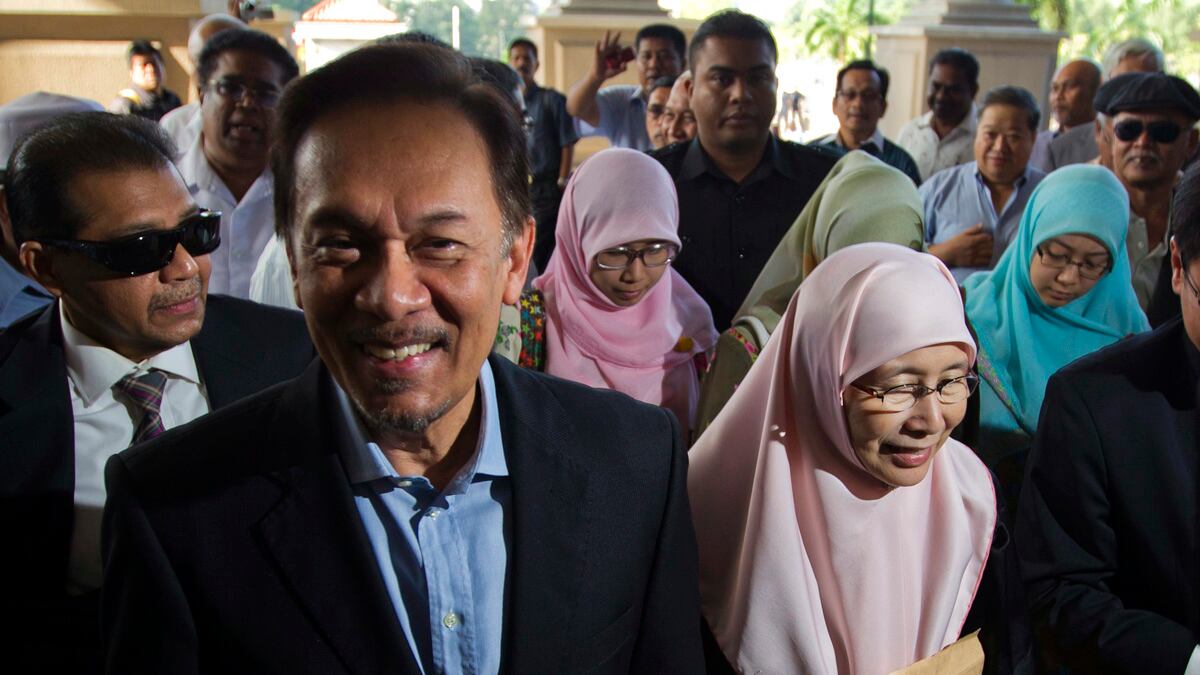Much has changed in Southeast Asia over the past decade. But travel to downtown Kuala Lumpur today, and walk along the Moorish-influenced public greens, and suddenly the Malaysian capital seems trapped in the 1990s.
At that time, the Asian financial crisis was battering the country’s economy, and urbanites hit by the downturn and frustrated by the country’s tightly controlled political system, had taken to the streets, where they were met by riot control troops, who battered them on a daily basis until the government’s long-ruling coalition put Anwar Ibrahim, the country’s popular opposition leader, on trial. The charge: Sodomy, a serious crime in a predominantly Muslim nation.
Though the trial was a farce—accusers later recanted their statements, and Anwar appeared in court with what the government called a “self-inflicted” black eye—he was convicted, and ultimately served six years in prison.
Today, the same story seems to be unfolding across the city. Anwar is again on trial for sodomy, in a sketchy case full of holes, which the government seems to have initiated to end his career and weaken the opposition. As a result, tens of thousands of middle-class Malaysians have been rallying, both to demand his freedom and for greater political openness, and once again, the government has responded with beatings, tear gas, and water cannon.
Yet unlike a decade ago, the demonstrators aren't likely to give up so easily. Though Anwar could once again be sent to jail, Malaysian politics have been changed irrevocably—both by him and by the current prime minister—and Malaysians seem unwilling today to accept anything less than real democracy.
Roughly 10 years ago, the trial of Anwar, a former government insider, drew sizable protests. But these demonstrations had little lasting impact. Anwar had only recently broken from the government, and the nascent opposition had few other leaders and little to no ability to organize in an effective fashion. The government had complete control of the print and broadcast media and easily rigged elections, making it difficult for activists to organize once the riot troops attacked. And while the Asian financial crisis had dealt a significant blow to Malaysia’s economy, the country was still doing better than others in the region, leading to some political complacency among the middle class.

Over the past decade, the country and the region have changed dramatically, even if Anwar’s plight has not. China and even Indonesia and Thailand have witnessed tremendous economic growth while Malaysia, whose weak education system and brutal politics have driven entrepreneurs out of the country, has seen its economy sputter. Educated Malaysians are fleeing the country, as is their purchasing power. And the spread of blogs and social media in a highly wired country has allowed activists to bypass the government-controlled media and combat election rigging, while a decade of largely grassroots organization has strengthened and diversified the opposition.
These days, a broad alliance of secular liberals and Chinese minorities who are inveighing against the state’s affirmative action policies for ethnic Malays, have aligned with an Islamist party that wants Sharia law to have greater influence in a mostly secular country. More united, these seemingly oppositional forces have managed to win four Malaysian state government elections, and in 2008, came close to gaining a majority in parliament.
During that election, an aide to Anwar named Mohd Saiful Bukhari Azlan suddenly came forward with new sodomy allegations against his boss. The fact that the accuser had waited 48 hours to make his accusation, ruining any potential semen samples—and that he met with senior government officials before making his claim—made the charges, which Anwar has denied, seem highly dubious.
As the trial proceeds this month, Malaysia’s judiciary seems unsure how to handle it. In the past, as in Anwar’s first trial, judges simply did whatever the government wanted; they fashioned their rulings to fit the punishment that the regime desired. But with public criticism mounting, and the opposition seemingly gaining momentum daily, the possibility that some of these judges could one day face punishment for unjust rulings has left them unsure of how to handle the case, and created an opening for a fair trial. Already, the judge has rejected some of the prosecution’s evidence, a small victory that Anwar rarely witnessed during his previous trial.
Whether or not Anwar is convicted, many senior government officials seem to now realize that Malaysia is bound to change, and that putting Anwar behind bars will not end calls for reform. Though hardliners in the ruling coalition, which have governed since the country’s independence in 1957, seem to be eagerly awaiting Anwar’s sentence, the country’s prime minister, Najib Tun Razak, has in recent months, begun to sound a lot like, well, Anwar himself.
In September, to the dismay of many Malaysians who had long viewed the prime minister as no different than his predecessors, Najib announced he was ending the decades-old Internal Security Act, which allowed the government to imprison anyone without charges. The prime minister has admitted that the country’s economy is faltering, and he’s tried to lure educated Malaysians back home. He’s even called for ending decades of affirmative action programs designed to benefit ethnic Malays—a risky move in a Malay-dominated country.
Najib has gone so far that, even if Anwar is acquitted, the ruling coalition might genuinely triumph in the 2013 parliamentary elections. Whatever the outcome of the trial and the election, the country should finally be able to move forward and Malaysians should finally be able to put the 1990s behind them.






